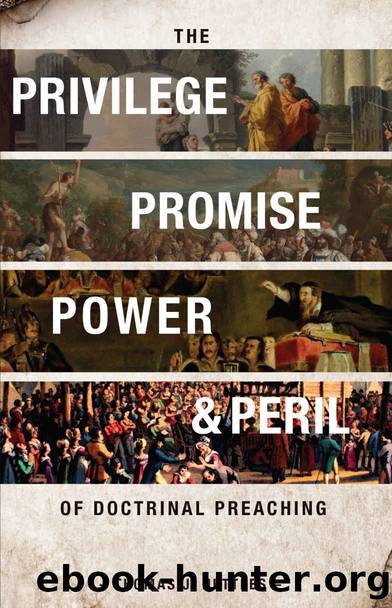The Privilege, Promise, Power & Peril of Doctrinal Preaching by Nettles Thomas J

Author:Nettles, Thomas J.
Language: eng
Format: epub
Publisher: Free Grace Press
Published: 2018-06-13T16:00:00+00:00
Jack-Rabbits and Creeds
Among the public impressions that gave Billy Sunday such popular appeal was his vigorous support of Woodrow Wilsonâs war effort. Wilson asked Sunday personally to raise the money instead of going overseas to speak to the troops. Sunday told Wilson, âMr. President, your wish is law with me.â He stayed home and âraised one hundred million dollars for Liberty and Victory Loans.â The money, at least it was so reported, that came in from the ten-week New York campaign in 1917 all went to the war to end all wars. In addition, 100,000 conversions were reported. Sunday recalled the last day in New York when â7436 people came forward and grasped my hand pledging to accept Christ as their Saviourâ (Sawdust, 75).
Sunday learned to raise money and handle his money well. With the help of âMaâ Sunday, he became highly solvent financially and was never accused of any misdealings with the money. In addition to a large contribution to the war on Germany, sometimes he would give the entire offering from a campaign to some local charity. He dressed well and dressed his family well. His home in Winona Lake, Indiana, was adequate but modest. Nevertheless, his income was many times that of the average person to whom he was preaching, and newspapers often sought to generate disdain for him on that account.
Sunday, though not primarily bent toward political and cultural issues, nevertheless was clear on where he stood on many of the stirring questions of the day. Most noted for his opposition to booze and his support of the eighteenth amendment, he never ceased, even after its repeal, to oppose the liquor traffic and describe the devastating social consequences of drunkenness. Describing himself as âthe sworn, eternal and uncompromising enemy of the Liquor Traffic,â he described his enemy as a âdamnable, dirty, rotten businessâ and âthe sum of all villainiesâ (Sawdust, 68). With powerful images, graphic words, and compelling statistics he worked to prove that it was âthe appalling source of misery and crime in the land.â Giving it license to propagate such misery âis the dirtiest, low-down, damnable business on top of this old earth.â[lxxxviii] Sunday also supported womenâs suffrage, trod carefully on racial issues but sought to oppose Jim Crow laws, and, though he had friends that were in big business, opposed monopolies and the tendencies to oppress the poor through price control.
Sunday was known also for his energetic assertion of fundamental biblical truth. He defended the Bible as the word of God, the doctrine of the Trinity, the deity and personality of the Holy Spirit, the deity of Christ, substitutionary atonement, and the cross of Christ as necessarily connected with salvation. He frequently mentioned Robert Ingersoll and that âbig brain of hisâ as the leading skeptic of the day, had read with some attention a number of other rationalistic critics of orthodox Christianity, and in opposition to their basic agnosticism, challenged them to propose something better than the Bible as the word of God and the cross as the way of forgiveness (Ellis, 424).
Download
This site does not store any files on its server. We only index and link to content provided by other sites. Please contact the content providers to delete copyright contents if any and email us, we'll remove relevant links or contents immediately.
Christian Ethics by Wilkens Steve;(854)
Christian Ethics for a Digital Society by Kate Ott(778)
Fearfully and Wonderfully Made by Philip Yancey & Paul Brand(768)
God and the Multiverse by Victor J. Stenger(670)
Numbers by Ronald B. Allen(632)
How to Read Slowly by James W. Sire(611)
Christian Ethics: An Introduction to Biblical Moral Reasoning by Wayne Grudem(596)
The City of God by Saint Augustine & Marcus Dods(577)
Monastic Archaeology by Unknown(564)
Morality by Jonathan Sacks(564)
The Technological System by Jacques Ellul(543)
Amish Grace by Donald B. Kraybill & Nolt Steven M. & Weaver-Zercher David L(529)
Death of the Doctor by Unknown(525)
The Disabled Church by Rebecca F. Spurrier;(521)
Jesus: A New Vision by Whitley Strieber(518)
Children of Lucifer; The Origins of Modern Religious Satanism by Ruben van Luijk(505)
Critical Writings by Joyce James;(499)
Redeeming Sociology by Vern S. Poythress(485)
The Church in the Early Middle Ages by G.R. Evans(473)
